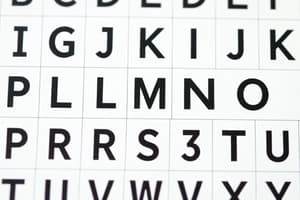Podcast
Questions and Answers
What is the numerical value of the character in the 10th position of the given sequence?
What is the numerical value of the character in the 10th position of the given sequence?
- 2
- 9 (correct)
- 3
- 4
How many times does the letter 'O' appear in the given sequence?
How many times does the letter 'O' appear in the given sequence?
- 4
- 1 (correct)
- 3
- 2
What is the alphabetical position of the 7th character in the sequence?
What is the alphabetical position of the 7th character in the sequence?
- 15
- 23
- 2
- 12 (correct)
What is the sum of the numerical values of the characters in the 3rd and 5th positions of the sequence?
What is the sum of the numerical values of the characters in the 3rd and 5th positions of the sequence?
How many alphabetic characters are present in the given sequence?
How many alphabetic characters are present in the given sequence?
What is the primary principle underlying the concept of federalism?
What is the primary principle underlying the concept of federalism?
Which of the following is a disadvantage of the system of checks and balances?
Which of the following is a disadvantage of the system of checks and balances?
What is the primary purpose of the system of checks and balances?
What is the primary purpose of the system of checks and balances?
Which of the following is an example of a natural right?
Which of the following is an example of a natural right?
What is the primary advantage of federalism?
What is the primary advantage of federalism?
Which branch of government has the power to declare laws and actions unconstitutional?
Which branch of government has the power to declare laws and actions unconstitutional?
Flashcards are hidden until you start studying
Study Notes
Federalism
- Federal system of government divides power between central authority (federal government) and smaller units of government (states)
- Characteristics:
- Dual sovereignty: both federal and state governments have authority over different areas of governance
- Shared powers: some powers are shared between federal and state governments
- Subsidiarity: power should be exercised at the lowest level of government possible
- Advantages:
- Promotes national unity and coordination
- Allows for regional autonomy and diversity
- Encourages innovation and experimentation at the state level
- Disadvantages:
- Can lead to conflicts between federal and state governments
- Can result in unequal distribution of power and resources
Checks and Balances
- System of government distributes power among three branches (legislative, executive, and judicial) to prevent any one branch from becoming too powerful
- Characteristics:
- Separation of powers: each branch has distinct and separate powers
- Mutual limitation: each branch has some ability to limit the actions of the other branches
- System of checks: each branch has some power to check the actions of the other branches
- Examples:
- Legislative checks on executive: Congress can impeach and remove the President
- Executive checks on legislative: President can veto legislation
- Judicial checks on both: Supreme Court can declare laws and actions unconstitutional
Individual Rights
- Protections and guarantees provided to individuals by the Constitution
- Types of rights:
- Natural rights: inherent rights possessed by individuals (e.g., life, liberty, property)
- Civil rights: protections against discrimination and unequal treatment
- Political rights: rights to participate in the political process (e.g., voting, free speech)
- Key amendments:
- 1st Amendment: freedom of speech, religion, and assembly
- 4th Amendment: protection against unreasonable search and seizure
- 14th Amendment: equal protection under the law
- 15th Amendment: right to vote regardless of race
Studying That Suits You
Use AI to generate personalized quizzes and flashcards to suit your learning preferences.




